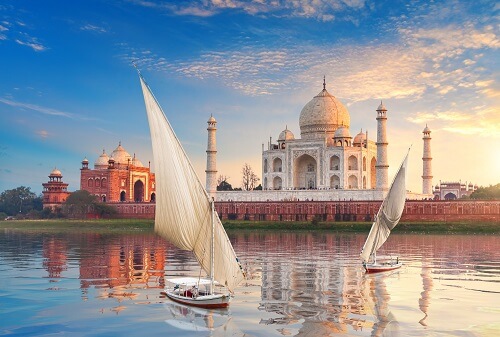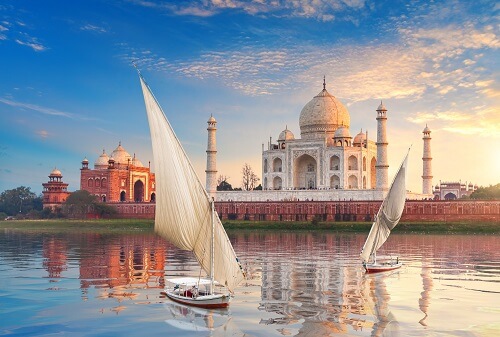India awakens your curiosity with its blend of spiritual beliefs and architecture, captivating you with its rich traditions, vibrant festivals, and stunning landscapes. International students who wish to study in India often choose programs such as medicine, STEM courses, and engineering.
India's education system is governed by multiple bodies that include:
- University Grants Commission (UGC): For mainstream university education.
- All India Council for Technical Education (AICTE): For technical education (engineering, management, etc.).
- National Medical Commission (NMC): For medical education.
- Bar Council of India (BCI): For legal education.
The system follows a 10+2+3 pattern:
- 10 years of primary and secondary education.
- 2 years of senior secondary education (or high school).
- 3 years for a bachelor's degree (4 for engineering, 5 for medicine, etc.

Types of Educational Institutions
- Central Universities: Funded by the Government of India and often the most prestigious.
- State Universities: Funded by individual state governments.
- Institutes of National Importance (INI): A status given to premier institutions that receive special funding and recognition from the government.
· Indian Institutes of Technology (IITs) - for engineering and technology.
· Indian Institutes of Management (IIMs) - for business management.
· National Institutes of Technology (NITs) - for engineering.
· All India Institute of Medical Sciences (AIIMS) - for medicine.
- Deemed-to-be-Universities: High-performing institutions granted the status of a university by the UGC.
- Private Universities: Established by private bodies but must be recognized by the UGC.
Popular Courses for International Students
- STEM Fields: Engineering (especially Computer Science, Mechanical, Electrical), Information Technology, Data Science, Biotechnology, and Pure Sciences (Physics, Chemistry, Mathematics).
- Medicine: MBBS, Dentistry, Nursing, and Ayurveda (traditional Indian medicine).
- Business & Management: MBA and BBA programs are highly sought after, particularly from the IIMs.
- Arts & Humanities: English Literature, Economics, Political Science, Sociology, and International Relations.
- Indian Culture & Languages: Sanskrit, Hindi, Classical Dance, Music, and Yoga. Many universities offer specialized courses in these fields.
The Study in India Admission Process
- Undergraduate (Bachelor's):
Entrance Exams: Most professional courses require national or state-level entrance exams.
- Engineering: JEE Main (for NITs/IIITs) and JEE Advanced (for IITs).
- Medicine: NEET (National Eligibility cum Entrance Test).
- Design: NID DAT, NIFT Entrance Exam.
- University-specific: Many universities, such as DU and BHU, have their own entrance exams.
Direct Admission: Some private universities admit based on Class 12th marks and their own counseling process.
- Postgraduate (Master's & PhD):
Entrance Exams:
- Management: CAT, XAT, MAT, GMAT (for some programs).
- Engineering: GATE.
- General: Each university conducts its own entrance exam for most MA, MSc, MCom programs.
Direct Admission: Based on the candidate's undergraduate performance.
Indian Scholarships for International Students
- Indian Council for Cultural Relations (ICCR) Scholarships: The most prominent scholarship for international students, covering tuition, accommodation, and a living stipend.
- Study in India Programme: A government initiative that offers fee waivers and scholarships to meritorious students.
- University-specific Scholarships: Most top universities offer their own merit-based and need-based scholarships for international students.
How to Apply for an Indian Student Visa
- Fill out the Online Application Form: Go to the official Indian Visa Online portal at indianvisaonline.gov.in and select the "Regular Visa Application".
- Select Your Indian Mission: Choose the Indian Mission in Lagos (CGI Lagos) as the application location before you fill out the rest of the form.
Supporting Documents
· The students must have the following documents before applying for a Visa or e-Visa:
- · Passport with 6-month validity
- · Passport size photographs
- · Photocopy of passport
- · Proof of residential address
- · A printed copy of the online (filled) form
- · Formal admission letter
- · Printed proof of fees paid to the institute
- · Details of the University
- · Bank Statement
Top Destinations for Students
- Delhi: The capital, home to Delhi University, JNU, and IIT Delhi. A hub for politics, culture, and history.
- Bangalore: The Silicon Valley of India, home to IIM Bangalore, nu
- merous IT companies, and a vibrant startup culture.
- Mumbai: The financial capital, with the University of Mumbai, IIT Bombay, and a fast-paced life.
- Chennai: A major cultural and educational hub in South India, home to IIT Madras and a strong medical sector.
- Hyderabad: A growing IT and pharma hub, with the University of Hyderabad and a rich history.
- Pune: Known as the Oxford of the East for its high concentration of universities and colleges.
Study Medicine in India
In India, study MBBS is considered one of the most prestigious and challenging courses. Admission to a medical school in India is dependent solely on a national-level entrance test called NEET (National Eligibility cum Entrance Test).
All MBBS aspirants must clear the entrance test for securing admission.
India Medical School Eligibility Criteria
- Students should pass class 12th or equivalent from a recognized board with a minimum score of 50%.
- Students should have studied chemistry, biology, and physics as main subjects in 12th class or equivalent.
- Students applying for admission in a medical school in India must fall in the age bracket of 12 to 25 years.
Medical School Admission Process
Medical Counselling Committee (MCC) conducts MBBS admissions through NEET for 15% of All India Quota (AIQ) seats. Students applying for AIQ MBBS admissions can secure a seat in any medical college throughout the country. State governments conduct MBBS admission for the remaining 85% of the seats.
Once the aspirants have qualified the NEET entrance exam, they will be eligible to go through the state and central-level counselling process conducted to grant admission in medical school in India. The students listed in the merit list by MCC are eligible to participate in the admission process.
Here is the step-by-step admission process you can follow to secure admission in medical school in India:
- Registration: Candidates aiming for 15% of AIQ MBBS seats must complete the registration process on the official website of MCC.
- Counselling Fee Payment: On the completion of the registration process, applicants are required to pay the specified counselling fee online.
- Locking Choices: After paying the counselling fee, candidates must submit their preferences. Candidates can also change the order of choices, delete existing ones or add new. Once done, they must lock the choices.
- Seat Allotment: Candidates are allotted seats depending on the choices locked by them and NEET merit score. The seat allotment letter can be downloaded through the official website.
- Reporting: Once they have downloaded the seat allotment letter, candidates are required to report to the college and submit all the mandatory documents. The admission will only be confirmed on reporting and submitting the required documents.
Read: Study in France: A Guide for International Students
Steps to Study in India
- Research: Identify your field of study and shortlist 8-10 universities.
- Check Eligibility & Deadlines: Visit the university's website for international student admissions. Deadlines are typically between December and March for courses starting in July/August.
- Prepare for Exams: If required, register and prepare for the necessary entrance exams.
- Apply: Submit applications along with required documents (transcripts, recommendation letters, statement of purpose, passport copy).
- Apply for Scholarships: Look into ICCR and other scholarship options simultaneously.
1. Why should international students choose India for higher education?
India offers world-class education at affordable costs. Many Indian universities are globally ranked, especially in medicine, engineering, IT, business, and the humanities. Students also benefit from India’s cultural diversity, English-medium instruction, and globally recognized degrees.
2. What is the cost of studying in India for international students?
Tuition fees in India are significantly lower compared to the US, UK, or Australia. On average:
- Undergraduate programs: $2,000 – $6,000 per year
- Postgraduate programs: $3,000 – $8,000 per year
- Medical programs (MBBS): $6,000 – $12,000 per year
Living expenses range between $2,000 – $4,000 annually, depending on the city.
3. What are the admission requirements for international students in India?
Admission requirements vary by university, but generally include:
- Academic transcripts (high school/college certificates)
- Passport and student visa
- Proof of English proficiency (TOEFL/IELTS may be required in some universities)
- Entrance exams for courses like medicine, engineering, and management (e.g., NEET, JEE, CAT)
4. Do I need a student visa to study in India?
Yes. International students must apply for an Indian Student Visa before starting their studies. Required documents include:
- Admission/offer letter from a recognized Indian institution
- Proof of financial support
- Passport with at least 6 months’ validity
- Recent passport photographs
5. Are there scholarships for international students in India?
Yes. Several scholarships are available, including:
- ICCR Scholarships (Indian Council for Cultural Relations)
- Study in India Scholarships
- State government and university-specific scholarships
These scholarships may cover tuition fees, accommodation, and living expenses.
6. Can international students work while studying in India?
Currently, India does not allow international students to work part-time while studying. However, after graduation, students may explore work opportunities in India by applying for a work visa or company sponsorship.
7. Which are the best courses for international students in India?
Popular courses include:
- Medicine (MBBS, Nursing, Pharmacy)
- Engineering (Computer Science, Mechanical, Civil, Electrical)
- Business & Management (MBA, BBA)
- Humanities & Social Sciences
- IT and Data Science
- Yoga, Ayurveda, and Indian Cultural Studies
8. What is the language of instruction in Indian universities?
Most universities offer programs in English, especially in professional fields like medicine, engineering, and business. Some institutions also offer bilingual or regional-language courses.
9. What is student life like in India for international students?
International students experience a vibrant mix of academics, culture, and social life. India is affordable, has diverse food options (including halal and vegetarian), and provides opportunities for cultural exchange. Major cities like Delhi, Bangalore, Mumbai, and Pune have large student communities.
10. Is India safe for international students?
Yes, India is generally safe for international students, especially on university campuses. Like any country, students are advised to follow safety guidelines, respect local customs, and stay connected with their institution’s international office.
11. How do I apply to study in India as an international student?
- Explore universities and programs through platforms like the Pay4Me App.
- Submit an online application with academic documents.
- Receive an admission/offer letter.
- Apply for an Indian Student Visa.
- Make travel and accommodation arrangements before the start of the semester.
12. Can I stay in India after completing my studies?
International students can apply for internships, research positions, or jobs in India after graduation, provided they switch from a student visa to an employment visa. Many graduates also use their Indian degree as a stepping stone to higher studies abroad.
13. How do I pay for my tuition?
To pay Indian tuition, use the Pay4Me App for your payments
Read: Study in Australia & New Zealand: 50 FAQs for International Students
FAQ: Studying Medicine (MBBS) in India for International Students

1. Can international students study medicine (MBBS) in India?
Yes. India admits international students to study MBBS in both government and private medical colleges recognized by the National Medical Commission (NMC) and listed in the World Directory of Medical Schools (WDOMS).
2. What is the eligibility for international students to study MBBS in India?
International students must:
· Complete 12 years of schooling (with Physics, Chemistry, Biology, and English).
· Score at least 50% in PCB subjects (some categories may have relaxation).
· Qualify in the NEET-UG exam (mandatory for admission in India and for future licensing).
· Provide valid passports, student visas, and other supporting documents.
3. Is NEET compulsory for foreign students?
Yes, NEET (National Eligibility cum Entrance Test) is compulsory for all students, including foreign nationals, to be eligible for MBBS admission in India.
4. What is the duration of the MBBS course in India?
The MBBS program in India typically takes 5.5 years:
· 4.5 years of classroom and clinical training.
· 1 year of compulsory rotatory internship.
5. What is the medium of instruction for MBBS in India?
The medium of instruction is English in almost all medical colleges that admit international students.
6. What is the cost of studying medicine in India for foreign students?
Tuition fees vary widely:
· Government colleges: USD 3,000 – 7,000 per year.
· Private colleges: USD 10,000 – 25,000 per year.
Living expenses are usually between USD 2,000 – 4,000 annually, depending on the city.
7. Which entrance exams are required to study MBBS in India?
Only NEET-UG is required for MBBS admission. Some private colleges may also conduct interviews, but NEET remains the mandatory qualifying exam.
8. Are Indian MBBS degrees recognized internationally?
Yes. MBBS degrees from Indian medical universities recognized by NMC are also listed in the World Directory of Medical Schools (WDOMS). Graduates can appear for licensing exams such as the USMLE (USA), PLAB (UK), AMC (Australia), and their home country’s medical licensing exams.
9. Do Indian medical colleges provide hostel and accommodation for foreign students?
Yes. Most universities offer separate hostel facilities for international students, providing basic amenities such as Wi-Fi, canteens, laundry services, and security. Private accommodation is also available in major cities.
10. Can international students work while studying medicine in India?
No. International students are not allowed to take up jobs while studying in India on a student visa.
11. What are the visa requirements for studying medicine in India?
Students need to apply for a student visa (S-Visa) issued by the Government of India. The visa is granted upon confirmation of admission and remains valid for the entire duration of the course.
12. How can international students apply for MBBS in India?
· Apply for NEET-UG and qualify.
· Apply directly to universities or through the “Study in India” initiative (for selected colleges).
· Submit required documents (academic transcripts, passport, NEET score, etc.).
· Secure an admission letter, then apply for a student visa.
13. What is the admission intake for MBBS in India?
Admissions typically begin between June and September, following the declaration of NEET results.
14. Why should international students choose India for MBBS?
· Globally recognized medical degree.
· Affordable tuition and living costs compared to Western countries.
· English medium instruction.
· Rich clinical exposure due to India’s large population and diverse cases.
15. What documents are required for MBBS admission in India?
· Valid passport and student visa.
· 10th and 12th grade transcripts.
· NEET-UG scorecard.
· Proof of English proficiency (if required).
· Passport-sized photographs.
· Admission letter from the medical college.




